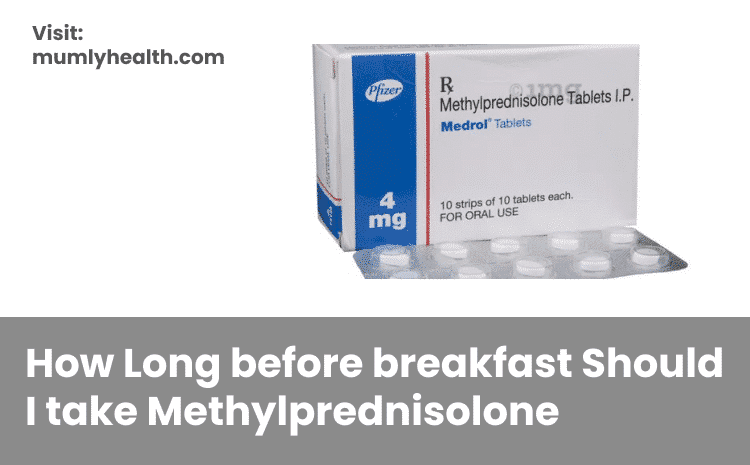Methylprednisolone functions as a form of steroid medication utilized to address conditions like asthma, allergic responses, arthritis, inflammatory bowel disorders, as well as issues related to the adrenal glands, blood, or bone marrow.
Its action involves reducing inflammation either by moderating an excessively active immune system or by substituting the natural cortisol produced within your body. The trade name associated with this medication is Medrol.
How Long before breakfast Should I take Methylprednisolone?
Methylprednisolone is a medication that belongs to the class of corticosteroids and is often prescribed to treat various medical conditions. The specific instructions for when to take methylprednisolone can vary based on the condition being treated and the formulation of the medication (tablet, injection, etc.).
However, in general, if you are prescribed methylprednisolone in tablet form and need to take it once a day, it's often recommended to take it in the morning, ideally with or after breakfast. This can help minimize the potential stomach upset that sometimes occurs with these medications.
Always follow your healthcare provider's instructions and the information provided on the prescription label. If you have any doubts or questions about the timing of your medication, it's best to consult your healthcare provider or pharmacist for personalized guidance based on your specific situation.
What information should I provide to my healthcare team before starting this medication?
Make sure to inform your healthcare team if you have any of the following conditions:
- Cushing's syndrome
- Eye disease or vision problems
- Diabetes
- Glaucoma
- Heart disease
- High blood pressure
- Infections, especially viral infections like chickenpox, cold sores, or herpes
- Liver disease
- Mental illness
- Myasthenia gravis
- Osteoporosis
- Recent or scheduled vaccinations
- Seizures
- Stomach or intestine issues
- Thyroid disease
- Any unusual or allergic reactions to lactose, methylprednisolone, other medications, foods, dyes, or preservatives
- Pregnancy or plans to become pregnant
- Breastfeeding
How should I use this medication?
Consume this medication orally with a glass of water. Follow the instructions on the prescription label. Take it with food. If you're taking it once daily, do so in the morning. Adhere to the directed dosage and do not exceed it. Do not abruptly discontinue the medication, as it may lead to severe reactions.
If your healthcare team advises stopping the medication, they may gradually reduce the dosage to prevent side effects. Discuss the use of this medication in children with your healthcare team; extra precautions may be necessary.
In case of an overdose, contact a poison control centre or an emergency room immediately. Remember, this medication is intended solely for your use; do not share it with others.
What if I miss a dose?
If you miss a dose, take it as soon as possible. If your next dose is nearing, consult your healthcare team. They will guide you on whether to skip or take an additional dose. Do not double up on doses without professional advice.
What potential interactions could occur with this medication?
Avoid taking this medication with:
- Alefacept
- Echinacea
- Live virus vaccines
- Metyrapone
- Mifepristone
This medication might interact with:
- Amphotericin B
- Aspirin and aspirin-like drugs
- Certain antibiotics like erythromycin, clarithromycin, troleandomycin
- Specific diabetes medications
- Antifungal drugs like ketoconazole
- Antiseizure medications like carbamazepine, phenobarbital, phenytoin
- Blood clot-preventing drugs like warfarin
- Cholestyramine
- Cyclosporine
- Digoxin
- Diuretics
- Female hormones, including estrogens and birth control pills
- Isoniazid
- Pain and inflammation medications like NSAIDs (ibuprofen, naproxen)
- Other myasthenia gravis medications
- Rifampin
- Vaccines
This list might not cover all possible interactions. Inform your healthcare provider about all the medications, herbs, over-the-counter drugs, or dietary supplements you use. Also, disclose any smoking, alcohol consumption, or illegal drug use, as they could impact interactions.
What precautions should I take while using this medication?
Inform your healthcare team if your symptoms don't improve or worsen. Do not cease usage without consulting them, as it could lead to severe reactions. Your healthcare team will determine the appropriate dosage.
This medication might increase your susceptibility to infections. Notify your healthcare team if you come into contact with someone with measles or chickenpox, or if you notice non-healing sores or blisters.
Be aware that this medication might raise your blood sugar levels. If you have diabetes, inquire with your healthcare team about potential diet or medication adjustments.
Promptly report any changes in your eyesight to your healthcare team.
Using this medication over an extended period might elevate the risk of low bone mass. Discuss bone health with your healthcare team.
Read Also: How Long Does Sudafed Stay in Your System
What potential side effects could I experience from using this medication?
Immediate medical attention is necessary for the following side effects:
- Allergic reactions like skin rash, itching, hives, facial swelling
- Signs of Cushing syndrome, include increased fat around the midsection, upper back, neck, or face, purple stretch marks, fragile skin, unexpected hair growth
- High blood sugar symptoms like increased thirst, excessive urination, weakness, blurry vision
- Rise in blood pressure
- Infection symptoms such as fever, chills, cough, sore throat, slow-healing wounds, pain while urinating, general discomfort
- Low adrenal gland function signs: nausea, vomiting, loss of appetite, fatigue, dizziness
- Mood and behaviour changes like anxiety, confusion, hallucinations, hostility, suicidal thoughts, worsening mood
- Stomach bleeding: bloody or black stools, vomiting blood or coffee ground-like material
- Swelling in ankles, hands, or feet
Less urgent side effects, which can still be reported, include:
- Acne
- General discomfort and fatigue
- Headache
- Increased appetite
- Nausea
- Sleep disturbances
- Weight gain
This list may not encompass all potential side effects. Consult your doctor for guidance. If you experience side effects, you can report them to the FDA at 1-800-FDA-1088.
Where should I store this medication?
Keep it out of the reach of children and pets.
Store at room temperature, between 20 and 25 degrees Celsius (68 and 77 degrees Fahrenheit). Dispose of any unused medication after its expiration date.



